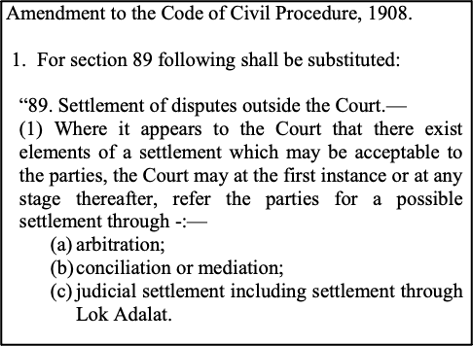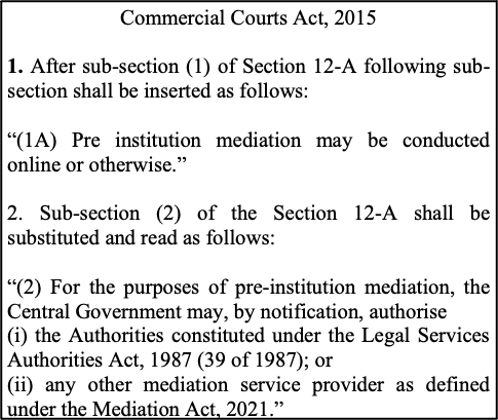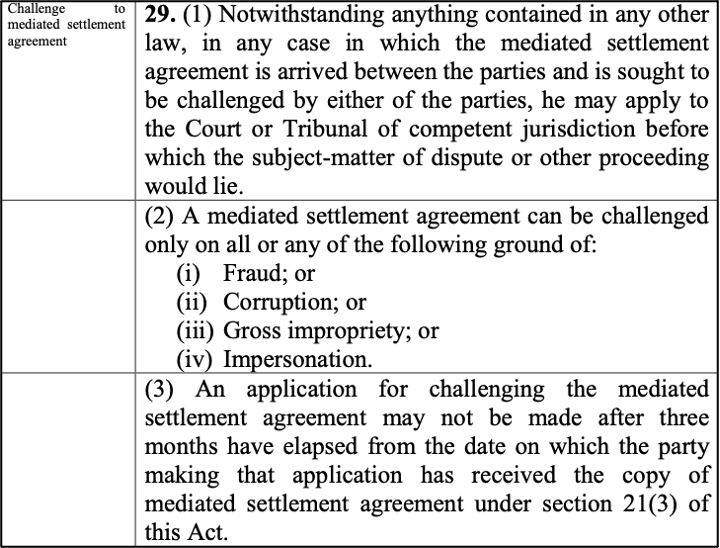Government of India has released a Draft Mediation Bill 2021 for promotion and strengthening of Alternative Dispute Resolution (ADR) mechanisms in India. In this article, we look at existing landscape of ADR in India and the significance of changes proposed by the Draft Bill.
Mediation is a process where an impartial third party is appointed to facilitate structured negotiation between disputing parties and help them reach a mutually agreeable settlement. It is known as an Alternative Dispute Resolution (ADR) mechanism, in other words, an alternative for litigation in courts. In addition to saving time and reducing litigation costs, mediation helps maintain relationships by promoting an amicable agreement.
In India, the laws on mediation are contained in several enactments. The present Draft Mediation Bill 2021 is an umbrella legislation with the objective to promote, encourage and facilitate mediation especially institutional mediation for resolution of commercial disputes and otherwise. The Bill takes into contemplation the international practice of using the terms ‘conciliation’ and ‘mediation’ interchangeably.
The Draft bill envisions to enforce domestic and international mediation settlement agreements, provide for a body for the registration of mediators, encourage community mediation and make online mediation an acceptable and cost-effective process.
Court-mediation cells, Lok Adalats, & Private ADR systems in India
To adequately execute the ADR mechanism, organizations like the Indian Council of Arbitration (ICA) and the International Center for Alternate Dispute Resolution (ICADR) were established as specialized arbitral body at the national level under the initiatives of the Government of India and apex business organizations like Federation of Indian Chambers of Commerce & Industry (FICCI), etc. The ICA was established in 1965 with the fundamental target to advance the genial and fast settlement of industrial and exchange disputes by arbitration. The ICADR is an autonomous association, working under the aegis of the Ministry of Law and Justice, to advance and create ADR facilities and techniques in India.
To promote the adoption of ADR mechanisms, the Legal Services Authorities Act, 1987 was revised to endorse the use of ADR methods. The Arbitration Act, 1940 was also revoked and the arbitration system was further promoted by the establishment of The Arbitration and Conciliation Act, 1996. In 2002, the Code of Civil Procedure (CPC), 1908 was amended to introduce Section 89. The amendment was instrumental in promoting alternative dispute resolution (ADR) processes in India, including mediation. Post this amendment, courts can refer disputes which are capable of being settled between parties to alternate dispute resolution (Code of Civil Procedure, Section 89). On several occasions, the Supreme Court has emphasised the importance of mediation, especially in commercial matters, and observed that this type of Alternative Dispute Resolution (ADR) is ideal for parties faced with complex issues that they are willing to resolve through negotiations.
Mediation, conciliation, negotiation, small-scale trial, consumer forums, Lok Adalats and Banking Ombudsman have just been acknowledged and perceived as powerful elective dispute-resolution methodologies.
Initially started in Gujarat in 1982, Lok Adalats have become one of the most popular Alternative Dispute Resolution (ADR) techniques in India, under the Legal Services Authorities Act, 1987. Lok Adalats have set the conciliation process in motion and have extended all over the country. Lok Adalats are organized with financial assistance from the Government and monitored by the Judiciary. Every award of the Lok Adalat is deemed to be a decree of a civil court. Similar is the condition in cases settled in the mediation cell referred through courts.
The establishment of court-annexed mediation programmes has gradually led the path for the establishment of private mediation institutions throughout the country — such as the Indian Institute of Arbitration and Mediation (IIAM), Centre for Advanced Mediation Practice (CAMP), and Foundation for Comprehensive Dispute Resolution (FCDR).
In recent years, mediation has been given further impetus by the inclusion of a provision in the Companies Act, 2013, which makes it mandatory for the central government to maintain a mediation and conciliation panel, comprising experts for mediating commercial disputes between the parties. Further, tribunals under the Companies Act or the central government may also refer a dispute to mediation where it deems it appropriate. Similarly, the Consumer Protection Bill (Consumer Bill), 2015 provides for mediating disputes at the first instance of admission of a complaint before any consumer disputes redressal agency.
Draft Bill strengthens pre-litigation model by proposing suitable amendments.
The Draft Bill proposes for pre-litigation mediation and at the same time safeguards the interest of the litigants to approach the competent adjudicatory forums/courts in case an urgent relief is sought.
‘Pre-trial mediation’ process is a provision which has been introduced in Section 89 of The Code of Civil Procedure (by Amendment Act of 2002) for pre-trial alternative settlement of disputes by efforts of the Courts before initiation of proceedings before it.
Although the Supreme Court has given some impetus to pre-litigation mediation, and it has taken a special role in matrimonial or family dispute cases, there exists no overarching framework for these services. A report titled ‘Strengthening Mediation in India’ by Vidhi Centre for Legal Policy (2016) highlights that this has resulted in a lack of uniformity across centres, with only some offering pre-litigation mediation services.
The study was focussed on the functioning of three court-connected mediation centres, namely the Bangalore Mediation Centre, the Mediation and Conciliation Centre of the Delhi High Court, and the Allahabad High Court Mediation and Conciliation Centre, between 2011 to 2015. The report recommended that an institutionalised pre-litigation model can supplement the court-connected model and could be explored further. The present Draft Bill strengthens the pre-litigation model by proposing suitable amendments to the Code of Civil Procedure 1908 and the Commercial Courts Act, 2015.


The registration of Mediation Settlement Agreement has also been provided for with State/District/Taluk Legal Authorities within 90 days to ensure maintenance of authenticated records of the settlement so arrived. Moreover, the mediation process protects the confidentiality of the mediation undertaken and provides for immunity in certain cases against its disclosure.
Draft Bill lays down limited grounds to challenge mediation agreements.
The Draft Bill provides that the successful outcome of mediation in the form of Mediation Settlement Agreement (MSA) has been made enforceable by law. Since the Mediation Settlement Agreement is out of the consensual agreement between the parties, the challenge to the same has been permitted on limited grounds.
The Vidhi Legal Centre report highlights that the major problem regarding enforcement of mediated settlements is the ambiguity regarding the grounds for challenging such settlements. Therefore, it recommended that the legislation should stipulate precise grounds for challenging mediated settlements by parties.
The Draft Bill addresses this concern by specifying the grounds on which a Mediation Settlement Agreement (MSA) can be challenged. A mediated settlement agreement can be challenged only on all or any of the following grounds.
- Fraud
- Corruption
- Gross impropriety
- Impersonation

Provides for establishment of Mediation Council of India.
Several reports have argued for adequate training standards, recognition, and accreditation for mediators. Apart from training, accreditation of mediators based on educational and professional background, basic and advanced training undergone by mediators, experience as a mediator (including the types of cases mediated), etc., should also be made common practice.
Report of the High-Level Committee to Review the Institutionalisation of Arbitration Mechanism in India (2017) finds that though various arbitral institutions have been set up in India, particularly in the last five years, they have not been preferred by parties, who have leaned in favour of ad hoc arbitration or arbitrations administered by arbitral institutions located abroad.
In identifying the roadblocks to the development of institutional arbitration, the report argues for the accreditation of arbitrators, the creation of a specialist arbitration bar and bench, and the provision of governmental and legislative support for institutional arbitration.
The Draft bill addresses the above concerns and provides for the establishment of Mediation Council of India and empowers the Council to:
- Frame regulations and guidelines for the conduct of mediation.
- Frame policies and lay down norms, qualification, and experience for accreditation of mediators as may be specified by regulations.
- Lay down the guidelines for the continuous education, certification, and assessment of mediators by the recognised mediation institutes.
- Lay down norms for registration of mediators.
- Register mediators and renew, withdraw, suspend, or cancel such registrations based on conditions as may be specified in the regulations.
Includes community mediation & envisions a comprehensive uniform legislation.
The Draft Bill emphasises that there is a strong need for a comprehensive uniform legislation for mediation in India which will cover the multiple aspects of its practice, encourage mediation including community mediation, and provide the platform of mediation for settling a wide range of disputes including domestic and cross-border commercial disputes, matrimonial, and other personal disputes.
The Draft Bill empowers the Central Government to enact appropriate legislations to give mediation settlements the status of an order, judgment, and decree besides establishing the Mediation Council of India and provide for recognition of mediation service providers, as envisioned in the Bill.
In its ambit, the Draft Bill also provides for community mediation. As per the Bill, any dispute likely to affect peace, harmony and tranquillity amongst the residents or families of any area or locality may be settled through community mediation. The Bill empowers the State Legal Service Authority, District Legal Service Authority or Taluka Legal Service Authority the power to notify a panel of mediators which may be revised from time to time as per need.
The following persons may be included in such a panel.
- Persons of standing and integrity who are respected in the community.
- Any local person including a state awardee whose contribution to the society has been recognised by the State.
- Representative of area/resident welfare associations.
- Any other person deemed appropriate.
The Draft specifies that the panel of mediators shall endeavour for resolving disputes through community-based mediation and provide assistance to parties for resolving disputes amicably. In every case where a mediated settlement agreement is arrived, the same may be recorded in writing with signature of the parties and authenticated by the mediators and in other cases, a failure report may be submitted to State/District/Taluka Legal Services Authority/District Magistrate/Sub Divisional Magistrate.
The scholarship on community mediation is contested. While community mediation is a time-tested and traditional mode of dispute resolution in India (village, panchayats), it can also perpetuate further injustice. As argued by the Report of Vidhi Centre for Legal Policy, a suitably reworked framework can present community mediation as a viable mediation option to people in different parts of the country. How the Draft Bill fares in achieving this, remains to be seen.
Featured Image: Draft Mediation Bill


